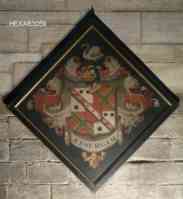
 Hover on
Hover onThumbnail
to
enlarge
Arms: Quarterly 1st and 4th argent on a bend gules between three roundels sable three swans argent [for Clarke]; 2nd and 3rd gules a saltire or surmounted by another vert [for Andrewes]; on an escutcheon in pretence gules on a bend argent three molets azure [for Shafto].
Crest: Upon a helm a swan proper in beak a roundel sable.
Mantling: gules and argent.
“Solemn Offenders.—In our last, we noticed briefly the case of the Rev. Robert Clerke, а man of fortune, and Lecturer at Hexham, who escaped, on a point of law, the full punishment due for having first seduced a simple girl of eighteen, (Eliz. Carr) then abandoned the unhappy creature to her. fate, and finally closed his career of profligacy by leaving his unfortunate offspring to be nurtured and provided for by the parish. On the trial, there was something of an attempt to throw a slur on the poor girl's previous conduct, but it totally failed— for the butler of Mrs. Shafto, (the lady in whose house the injured creature lived) swore that he had never witnessed anything incorrect in her behaviour.—This vile attempt might certainly have been made by the Reverend Gentleman's Counsel without his concurrence; but when it man of fifty can deliberately betray, and subsequently abandon a poor young creature— quite young enough to be his own child,—leaving also the innocent offspring to its fate, one is rather prone to suspect, that he would not much hesitate at any line of defence, which be might suppose would tend to lessen the odium of his proceedings. In this however he or his Counsel failed; and though the Reverend Gentleman has avoided all the legal penalties of his guilt,—though he may at this very moment be congratulating himself that he has escaped in pocket, yet of this the Lecturer of Hexham may be assured, that while truth and justice and sensibility remain on earth, his falsehood and injustice and brutality will be remembered. He may go and count his pitiful savings,—he may or may not continue to violate m his own person all the decencies and charities of life, while he is lecturing others on their due and careful performance of them,—but the public hatred and contempt must he his inevitable portion, at least till he has attempted all in his power to soften the condition of her who owes her wretchedness to his guilt.” [ibid. p.523]
1823: A B Wright dedicated his “… History of Hexham …” to the Rev. Robert Clarke, A.M.
“1824 … April 20.— Died, in Bridge-street, Blackfriars, London, the Rev. Robert Clarke M.A. of Walwick, rector and lecturer of Hexham, aged 53 years. May 1st, his remains arrived at Newcastle in a hearse with six horses, followed by a mourning coach with four horses; and on the 3rd, the mournful procession was joined by several private carriages, and set out with considerate heraldic splendour for Hexham, displaying a great number of banners and escutcheons. The day was one continued storm of wind and rain, but notwithstanding, as the procession approached its destination, it was met and joined by the members of the different trades, and almost all the inhabitants of Hexham, in deep mourning, to testify their respect for the deceased. The shops were shut, the bells tolled at intervals, and the throng of people, accumulating as the hearse advanced, produced an effect of imposing and melancholy awe, which was much heightened by the solemn order of the procession, the rear of it being composed of a great number of respectable gentlemen of Hexham and its neighbourhood, who walked in pairs. The funeral service was performed by the Rev. C. Lee, and after a solemn dirge on the organ, Luther's sublime hymn was impressively chaunted. By the death of this great and good man, the town and neighbourhood of Hexham suffered an almost irreparable loss, and numerous odes, elegies, &c. &c., were written on the occasion. As a proof of the general estimation in which this gentleman was held, a sermon was preached on the occasion, in the Presbyterian chapel, Hexham, on Sunday May 9th, 1824, by the Rev. James Richardson, from 2d Samuel, 3d chap. 38th verse, and which was published by request.” [John Sykes “Historical Register” vol.II p.173]